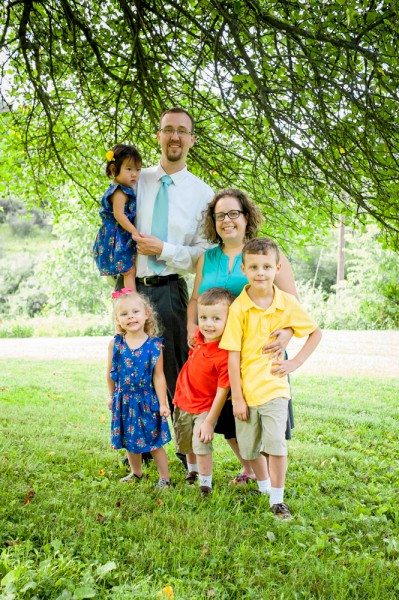Our daughter’s special need wasn’t on a checklist. Even today, we still don’t know what her special need is. Her medical history is a complete mystery. With no birth story, we will never have all of the pieces to the puzzle. Yet, her puzzle will not always be incomplete. In fact, as we put these new pieces into the puzzle of who she is, we are seeing a beautiful redeeming story.
When we received our daughter’s referral, her special need was described as “high muscular tension” and “developmental delay”. We asked for updated information. We tried to get a good picture of our daughter, but it was fuzzy and confusing. We were pretty sure, as we prepared to travel to China, she might be a little more behind then we had originally thought.
When she was placed in our arms, we were stunned. We had suspected the original file might be incorrect, and we were right. She did not have “high” muscle tone. She had quite the opposite. Her muscles were so weak she could barely sit. Her head wobbled back and forth. Her arms barely lifted above her chest. Her muscle tone was so low. How did we miss this? We began suspecting cerebral palsy (which was a big no when we were filling out the medical checklist…)
After normal blood work and a clear CT scan, we have determined… nothing. Our doctor suspects her delays are from malnutrition. She has been home for six months, and although we have seen lots of progress, we are still at a loss as to why her muscle tone is so low. Living with the unknowns is hard. We take one day at a time.
Parenting a child with low muscle tone comes with challenges. At the age of two and a half, she is unable to walk and can only crawl a little. She tires easily. She barely feeds herself with her hands. She has a hard time holding on when you hold her. But I want to encourage you, low muscle tone is definitely doable. Thankfully, I can still carry her. We recently had her fitted for a pair of SureStep SMO orthotics. Those have been amazing! I love seeing her take more confident steps in them. It takes some adapting, but she is our youngest, so we treat her much younger than her physical age. The physical limitations are not debilitating. I see them as hurdles we just need to jump over.
In our state, we have a wonderful Birth to 3 program which provides in-home therapy until the child turns 3. They provide OT, Speech, Developmental Therapy, and PT. The physical therapist has been amazing. She has taught us how to strengthen her muscles, including exercises to help her core muscles grow stronger. After four months of therapy, she can cruise along the couch, sit up straight, and is learning to walk with a walker.
Our daughter’s low muscle tone affects all parts of her body. Even with 5-on-1 love for the past six months, she is still not saying any words. When she was first brought home, she barely babbled. It seemed her voice could only cry. It has taken almost six months for us to hear a genuine laugh. Her inability to even mimic sounds causes us to wonder and worry.
The speech therapist is helping to introduce sign language. In only four months, she has learned thirty signs! Parenting a non-verbal child has been the most difficult. Cognitively, she is only about a year (or less) behind her actual age. So she has thoughts and ideas she would love to communicate, but cannot. In turn, the tantrums, possessiveness, and food insecurities are much worse.
Once again, parenting a child who is nonverbal is challenging, but completely adaptable! Even these past two weeks, I’ve seen an explosion of signs. The other day she signed “mommy” while my husband was holding her and reached for me. If we weren’t in the middle of a hallway at church I would have cried with joy! We plan on putting up a picture chart next week to help her point and tell us what she wants. Once again, just hurdles. Not brick walls.
Low muscle tone has also affected her chewing ability. When we first brought her home, she could not chew. We believe she probably had never had solid foods. So began the most stressful and tiring part of parenting. With the help from our feeding specialists (who is also our speech specialist), we’ve made huge strides. She will chew hard, crunchy foods, but still sucks on the soft foods. We’ve seen a lot of improvement. The feeding specialist showed us techniques for how to hold the food to help her learn to chew, and how to teach her to use a straw! All of this she’s improved with in less than two months. The food insecurities and anxiety related to food are still present. It is “normal” for children who have come from hard places to have a myriad of food insecurities. We are working on it.
The other day I was in our church’s nursery. I glanced over at a little girl who was only about seven months old. The same amount of time our daughter has been home. Seven months. I noticed her head and back were straight. She sat up. Made gurgling sounds. Her eyes locked into mine. Perfect eye contact. I looked away, embarrassed and sad. My two and half year old daughter does none of that. It hurts. I almost cried. It is hard to see other children make progress more quickly, while your child seems “stuck.”
When parenting a child with so many unknowns, who is behind, physically, mentally, verbally, and developmentally, it can be overwhelming. You wake up each morning to routines and coping mechanisms. Survival becomes the norm. You live from one meltdown to the next. Sometimes your own tears mix with theirs.
If you are parenting a child who is nonverbal and developmentally delayed, I want to encourage you. Hold on to these truths while you strive to the best parent for your child.
The Past Does not Dictate the Future. It is hard. I mean hard not knowing her medical condition. The why to her physical, speech, and developmental delays are never going to be answered. BUT the puzzle will not always be a mystery. We are building something new with our children when we bring them home. We cannot ignore their past, but we don’t have to dwell on it. When we first came home, I daydreamed about her birth. I began imagining a hundred different scenarios. Each one explaining her present condition. It did nothing for my heart but discourage it. Instead, I try to daydream about her future. I imagine her as a six-year-old little girl. A teenager. An adult. I’m excited because there will be no more unknowns now that she is with us. We will know from the time she was two-years-old ALL of her medical history.
God is Redeeming. As I think about my daughter today, I am not overwhelmed or saddened by the mystery. I am rejoicing in our God, and how He is changing her (and me). Only God knows the beginning to the end. He sees the beautiful masterpiece she will become at the end of her life. Only God sees how He is taking a broken, lonely orphan and making her into a daughter, beloved and cherished, full of hope. In Liana’s story, I’ve seen my own story. I’ve seen the hard places and lonely paths I’ve walked before God began redeeming me. I can rest assured. He who is working in my life, is also working in the life of my daughter. Her life is one of redemption and Glory to God.
Small Steps are Worthy of Note. I blame the “China fog” for the first three months home. I don’t remember much, as we were all in survival mode. Now that six months have passed, I have come out of the valley and am beginning to enjoy all of the little moments and small steps. She said her “first word” this week. Her steps are becoming more steady. Her choking at mealtimes are less and less. Take note of all of the small, seemingly insignificant things. Adoption milestones might look a little bit different than normal milestones, but that’s O.K. We can rejoice and remember the times our children first reached for us. Maybe we can write down the date they first cried for us. I remember two weeks ago the first time Liana left three bites on her plate! That is huge for a little one with food insecurities. Make note of and write down all of the sweet milestones your child makes.
Enjoy the Present. Dwelling on the past and obsessing about the future will not make things easier when it comes to parenting your developmental delayed little one. Enjoy right now. Enjoy all of the things he/she can do right now. Love the things they love. Give them extra time during the day to just cuddle. Or extra kisses and hugs. There are months of loneliness we are trying to make up for. Enjoy their smile. Enjoy the beautiful things that make them unique. Help them discover new things and dwell on the present.
One of my favorite adoption verses is found in Psalm 68:6, “God places the lonely in families; He sets the prisoners free and gives them joy.” As I was reading this Psalm again the other day, I read verse nineteen, “Praise the Lord; praise God our savior! For each day he carries us in his arms.” Each day our God carries us! One of the ways we survive parenting is by living in today. Let God carry you TODAY. His grace is sufficient for TODAY. No matter you child’s special need, God will carry you. Each Day. And everyday after that. Live in today, knowing He will give you the wisdom, patience, and love to care for your child. Rest in Him.
“God is awesome in his sanctuary. The God of Israel gives power and strength to his people. Praise be to God!” Psalm 68:35
– guest post by Sarah





























What a wonderful real life story. You and your family are beautiful. I love seeing how the Lord is allowing growth in all aspects in your lives.
I so love this. Our son with albinism is almost exactly the same except he repeats everything, but nothing is really sticking. It is hard, but luckily he is pure joy (we also had one who raged constantly.). Hugs and prayers
Love this.